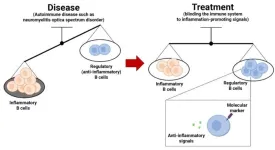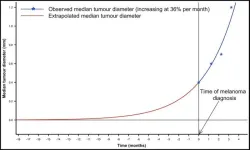(Press-News.org) TUCSON, Ariz., June 18, 2024 — Critical Path Institute (C-Path), a leader in accelerating drug development for rare diseases, today announced the targeted integration of additional Friedreich’s ataxia (FA) datasets into C-Path’s Rare Disease Cures Accelerator-Data and Analytics Platform (RDCA-DAP®) as part of a partnership with Friedreich’s Ataxia Research Alliance (FARA).
This update includes data from two natural history studies; the FA-CHILD study, which focuses on pediatric patients with FA, and an expanded version of the FA-COMS study, which now encompasses over 20 years of data collection and spans multiple years among 1,450 patients with FA throughout the U.S., Canada, Australia, New Zealand and India.
In addition, the Friedreich’s Ataxia Integrated Clinical Database (FA-ICD) platform for data access will be discontinued to centralize and improve access to FA data in RDCA-DAP, which provides advanced security and analytical tools. Conducted in collaboration with FARA, this comprehensive integration is set to enhance the impact and efficiency of research efforts directed at combating FA, a debilitating, life-shortening, degenerative neuromuscular disorder, exemplified by the contribution of the FARA data through RDCA-DAP to augment the regulatory evidence successfully presented for the first disease modifying treatment for this disease.
The FA-ICD, which contains critical data from numerous clinical trials and a detailed natural history study, was initially managed by C-Path as part of its online data repository. Under the new arrangement, the FA-ICD dataset along with other new FA datasets can be accessed by the research community. The full integration into RDCA-DAP strengthens the platform’s capabilities, ensuring a more effective use of data for research and development.
RDCA-DAP, lauded for its robust infrastructure for data aggregation and analytics, supports the characterization and advancement of therapies for rare diseases.
“The incorporation of FA-ICD into RDCA-DAP substantially expands our data resources and sharpens our analytical precision,” explained Alexandre Bétourné, Pharm.D., Ph.D., Executive Director of RDCA-DAP. “With this enhanced scope and clarity, we’re better equipped to uncover insights that drive the development of effective therapies for Friedreich’s ataxia.”
Bétourné also highlighted the benefits of this strategic integration, noting, “By leveraging the comprehensive data from FA-ICD, now fully integrated within RDCA-DAP, we are better equipped to accelerate the pace of discovery, fostering the development of novel therapeutic approaches and substantially improving patient outcomes.”
Jennifer Farmer, CEO of FARA, emphasized the significance of this partnership and importance of sharing patient contributed data. “FARA is excited to continue our collaboration with C-Path and foster data sharing from natural history studies and clinical trials to enhance research and analysis aimed at improving outcomes and developing treatments for Friedreich’s ataxia. We believe in making patient contributions of data as meaningful as possible and one way to honor this is by ensuring that such data is available to the research community through a secure and robust platform.”
“RDCA-DAP’s extensive resources can amplify the impact of the existing data and foster new discoveries in FA research. This collaboration will build upon our strong, sustained, and productive partnership with the C-Path team,” said Farmer.
Looking ahead, C-Path anticipates that this integration will not only streamline research efforts but also enhance the global research community’s access to high-quality, actionable data, potentially reducing the time and cost associated with bringing new therapies to market.
For more information about contributing data to RDCA-DAP or to learn more about this collaborative effort, please visit c-path.org/rdca-dap or contact rdcadap@c-path.org.
About Critical Path Institute
Critical Path Institute (C-Path) is an independent, nonprofit established in 2005 as a public-private partnership, in response to the FDA’s Critical Path Initiative. C-Path’s mission is to lead collaborations that advance better treatments for people worldwide. Globally recognized as a pioneer in accelerating drug development, C-Path has established numerous international consortia, programs and initiatives that currently include more than 1,600 scientists and representatives from government and regulatory agencies, academia, patient organizations, disease foundations and pharmaceutical and biotech companies. With dedicated team members located throughout the world, C-Path’s global headquarters is in Tucson, Arizona and C-Path’s Europe subsidiary is headquartered in Amsterdam, Netherlands. For more information, visit c-path.org.
Critical Path Institute is supported by the Food and Drug Administration (FDA) of the Department of Health and Human Services (HHS) and is 54% funded by the FDA/HHS, totaling $19,436,549, and 46% funded by non-government source(s), totaling $16,373,368. The contents are those of the author(s) and do not necessarily represent the official views of, nor an endorsement by, FDA/HHS or the U.S. Government.
END
C-Path partners with FARA to fortify RDCA-DAP and further accelerate drug development with new Friedreich’s Ataxia Data
The team also announced the closure of the FA-ICD portal
2024-06-18
ELSE PRESS RELEASES FROM THIS DATE:
Rigorous new study debunks misconceptions about anemia, education
2024-06-18
In low- and middle-income countries, anemia reduction efforts are often touted as a way to improve educational outcomes and reduce poverty. A new study, co-authored by a global health economics expert from the University of Notre Dame, evaluates the relationship between anemia and school attendance in India, debunking earlier research that could have misguided policy interventions.
Santosh Kumar, associate professor of development and global health economics at Notre Dame’s Keough School of Global Affairs, is co-author of the study, published in Communications ...
Existing high blood pressure drugs may prevent epilepsy, Stanford Medicine-led study finds
2024-06-18
A class of drugs already on the market to lower blood pressure appears to reduce adults’ risk of developing epilepsy, Stanford Medicine researchers and their colleagues have discovered. The finding comes out of an analysis of the medical records of more than 2 million Americans taking blood pressure medications.
The study, published June 17 in JAMA Neurology, suggests that the drugs, called angiotensin receptor blockers, could prevent epilepsy in people at highest risk of the disease, ...
ACM recognizes innovators who solve real world problems
2024-06-18
ACM, the Association for Computing Machinery, today announced the recipients of four prestigious technical awards. These four awards in diverse categories celebrate the hard work and creativity which underpin many of today’s most important technologies.
Prateek Mittal, Princeton University, is the recipient of the 2023 ACM Grace Murray Hopper Award for foundational contributions to safeguarding Internet privacy and security using a cross-layer approach.
The unifying theme in Mittal’s ...
Wooden surfaces may have natural antiviral properties
2024-06-18
Viruses, including the coronavirus that causes COVID-19, can get passed from person to person via contaminated surfaces. But can some surfaces reduce the risk of this type of transmission without the help of household disinfectants? As reported in ACS Applied Materials & Interfaces, wood has natural antiviral properties that can reduce the time viruses persist on its surface — and some species of wood are more effective than others at reducing infectivity.
Enveloped viruses, like the coronavirus, can live up to five days on surfaces; nonenveloped viruses, including enteroviruses linked to the common cold, can live for weeks, in some cases even if the ...
For sustainable livestock farming bordering the Amazon Rainforest, look to the women
2024-06-18
When trees and livestock compete for land, the trees usually lose. It doesn’t have to be this way. But centrally designed plans to implement tree-livestock coexistence in deforested areas don’t always work on faraway farmland.
The ineffectiveness can be due to trying to accomplish too much too quickly. Transforming hundreds of thousands of hectares of treeless or degraded pastures into sustainable landscapes for livestock, nature and people should be a gradual, low-disruption process. And it should start ...
Dr. Felice J. Levine to step down as AERA Executive Director in June 2025
2024-06-18
AERA President Janelle T. Scott and Executive Director Felice J. Levine issued the following joint letter on June 18, 2024.
Dear AERA Members, Colleagues in the Field, and Leaders in Research and Education:
We are writing this joint letter to announce that Felice has decided to step down as Executive Director (ED) effective June 15, 2025. As she entered her fifth consecutive term, she signaled that she wished to move to an Emerita status next June and would not seek a further term of office. We both want to communicate this news now to provide sufficient lead time to conduct a search and ensure a smooth transition.
As ...
Treatment for autoimmune disorder acts on balance of immune cell types
2024-06-18
Autoimmune diseases cannot currently be cured, only treated, and this is also true for neuromyelitis optica spectrum disorder, which affects the central nervous system. A Kobe University study of how the treatment acts on the immune system shows that it shifts the balance of types of immune cells. This finding may represent a step toward the development of personalized medicine for autoimmune diseases.
An autoimmune disease is the body’s immune system turning against parts of the body itself. Neuromyelitis optica disorder spectrum, or NMOSD, is one of them and it causes inflammation of the central nervous system, leading to vision and sensory loss, weakness ...
Anti-inflammatory drug celecoxib could reduce risk of colon cancer recurrence for a subset of patients
2024-06-18
Boston – An analysis of data from a randomized clinical trial for patients with stage 3 colon cancer found that those with PIK3CA mutations who took celecoxib, an anti-inflammatory drug, after surgery lived significantly longer and had longer disease-free survival compared to those without the mutation. The study, highlighting a potential breakthrough in personalized cancer treatment, was led by clinical investigators at Dana-Farber Cancer Institute and Brigham and Women’s Hospital.
These findings are ...
Social inequalities widen after a breast cancer
2024-06-18
When it comes to health, inequalities can be seen at every level for women with breast cancer: prevention, screening, diagnosis, treatment, and survival. But what about their quality of life? A team from the University of Geneva (UNIGE), the University Hospitals of Geneva (HUG), Inserm, and Gustave Roussy has tracked nearly 6,000 women diagnosed with breast cancer over a 2-year period, showing that socioeconomic status has a major and lasting impact on their quality of life, despite identical medical treatment. These results from the UNICANCER-sponsored CANTO study, published in the Journal of Clinical Oncology, call ...
When does a melanoma metastasize? Implications for management
2024-06-18
“[...] immunotherapy is more likely to be effective at eliminating metastatic disease if the tumor burden is low, making it more logical to treat patients with high-risk melanomas at the earliest possible time [...]”
BUFFALO, NY- June 18, 2024 – A new research perspective was published in Oncotarget's Volume 15 on June 13, 2024, entitled, “When does a melanoma metastasize? Implications for management.”
In this new perspective, researchers John F. Thompson and Gabrielle J. Williams from The University of Sydney, Royal Prince Alfred Hospital, and the University ...
LAST 30 PRESS RELEASES:
Boys are more motivated, while girls are more compassionate?
Study identifies opposing roles for IL6 and IL6R in long-term mortality
AI accurately spots medical disorder from privacy-conscious hand images
Transient Pauli blocking for broadband ultrafast optical switching
Political polarization can spur CO2 emissions, stymie climate action
Researchers develop new strategy for improving inverted perovskite solar cells
Yes! The role of YAP and CTGF as potential therapeutic targets for preventing severe liver disease
Pancreatic cancer may begin hiding from the immune system earlier than we thought
Robotic wing inspired by nature delivers leap in underwater stability
A clinical reveals that aniridia causes a progressive loss of corneal sensitivity
Fossil amber reveals the secret lives of Cretaceous ants
Predicting extreme rainfall through novel spatial modeling
The Lancet: First-ever in-utero stem cell therapy for fetal spina bifida repair is safe, study finds
Nanoplastics can interact with Salmonella to affect food safety, study shows
Eric Moore, M.D., elected to Mayo Clinic Board of Trustees
NYU named “research powerhouse” in new analysis
New polymer materials may offer breakthrough solution for hard-to-remove PFAS in water
Biochar can either curb or boost greenhouse gas emissions depending on soil conditions, new study finds
Nanobiochar emerges as a next generation solution for cleaner water, healthier soils, and resilient ecosystems
Study finds more parents saying ‘No’ to vitamin K, putting babies’ brains at risk
Scientists develop new gut health measure that tracks disease
Rice gene discovery could cut fertiliser use while protecting yields
Jumping ‘DNA parasites’ linked to early stages of tumour formation
Ultra-sensitive CAR T cells provide potential strategy to treat solid tumors
Early Neanderthal-Human interbreeding was strongly sex biased
North American bird declines are widespread and accelerating in agricultural hotspots
Researchers recommend strategies for improved genetic privacy legislation
How birds achieve sweet success
More sensitive cell therapy may be a HIT against solid cancers
Scientists map how aging reshapes cells across the entire mammalian body
[Press-News.org] C-Path partners with FARA to fortify RDCA-DAP and further accelerate drug development with new Friedreich’s Ataxia DataThe team also announced the closure of the FA-ICD portal






